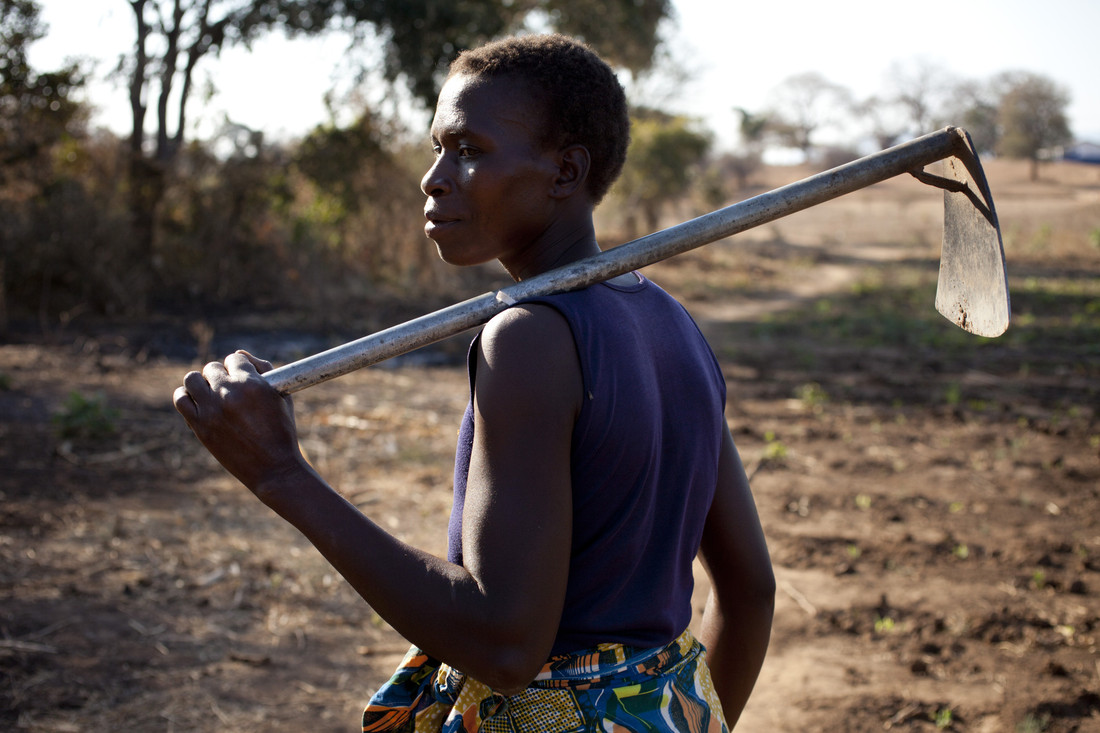From Paris to Morocco, the climate road leads through Lusaka – 3 lessons from the AfDB Annual Meetings
 Barbara, a low-income farmer in Chiawa, Zambia on her way to her fields. (Photo: Abbie Trayler-Smith / Oxfam) Barbara, a low-income farmer in Chiawa, Zambia on her way to her fields. (Photo: Abbie Trayler-Smith / Oxfam)
Barbara, a low-income farmer in Chiawa, Zambia on her way to her fields. (Photo: Abbie Trayler-Smith / Oxfam) Barbara, a low-income farmer in Chiawa, Zambia on her way to her fields. (Photo: Abbie Trayler-Smith / Oxfam)
If the climate conferences in Paris and Morocco are going to mean anything we need to be making meaningful changes on the road between them.
It’s great to be back in Zambia – the place where I was born. It’s equally painful to see firsthand some of the growing challenges this country and region now face: an environment ravaged by climate change, power load shedding of up to 10 hours a day, and an economy on its knees as a result. Our own Oxfam Zambia office has to rely heavily on an expensive diesel generator to try and keep up – I’ll never complain about the air conditioning in my office again.
Faced with these challenges following the Paris climate conference we’re now turning to Africa to find good energy solutions at this week’s African Development Bank (AfDB) Annual meetings themed around energy and climate change. Yet so far we have heard only mixed messages from leaders on these critical issues.
Since arriving in Lusaka, I’ve come away with three things that I hope will help inform some of the challenges around energy, climate and development.
- We place too much emphasis on on-grid solutions, and not enough on off-grid.
Over the last several months, there has been lots of signaling and good intentions on energy access. The AfDB even recently scored some points on energy access among its peers for announcing its New Deal on Energy – even though the deal ultimately scored an ‘F” along with the other Banks rated. (And frankly, listening to some of the dialogue this week I can see why.)
Since the majority of the energy poor live far from “the grid” and the majority of energy financing continues to go toward typical on-grid solutions (such as coal, natural gas, and large-scale hydro), we and many others have been pushing for a greater emphasis on off-grid technologies That said, it’s clear that Africa’s energy challenge requires a mix of both on-grid and off-grid energy solutions.
On-grid will be needed, especially for industrial and urban use. But because the benefits of on-grid power often fall short of helping the extreme poor, who often live in rural areas, far away from the grid, off-grid options like solar are still very relevant. Especially since current discussions are focused on high-risk on-grid projects such as coal and natural gas, which we can expect will take a long time before they generate any electricity.
On the other hand clean off-grid options have access benefits that can be realized immediately by the poorest households. In addition, such technologies bring other benefits due to their relatively low environmental impact, including: limited air and water use and pollution, reduced land impacts, improvements in people’s daily lives (e.g., lighting and refrigeration in homes), and faster speed of deployment.
- We can’t forget the ‘sustainable’ in sustainable energy.
Zambia’s load shedding problem is directly attributable to the impacts of climate change. Approximately 95 percent of its energy comes from hydro power, but due to drought over the last few years, river flow has reduced and thus so has the supply of hydro-electricity. It’s a problem that will only get worse, as climate-induced droughts increase in severity. Yet the chatter about more and bigger dams has only increased. These projects are not only ill-advised based in the environmental realities, but they pose serious risks to communities and ecosystems, not to mention the resettlement issues that too often surround the construction of such projects.
Statements we’ve heard from leaders here in Lusaka about prioritizing development over the environment are missing the point: they’re inseparable; development and environmental protection are mutually dependent. Failure to take a holistic approach to energy planning risks further harm, fails to provide energy to those that need it, and ultimately stunts development.
- Equity concerns are not going anywhere, nor should they.
The issue of equity has been percolating throughout the AfDB meetings, particularly around the idea that Africa should not have to compromise its development to address the impacts of climate change they are least responsible for causing. We couldn’t agree more. Developed countries need to step up their responsibilities for greater action and support for climate finance. We might even expand the equity conversation to include concerns around the sale of the last of the world’s fossil fuels, and who has the right to benefit from those sales. Preventing catastrophic climate change is in everyone’s interest, especially when it makes the most sense to invest in clean technologies that are more equitable and in provide energy access to the most people.
As we head back to Africa in a little over six months’ time for the next climate conference in Morocco, I hope that we can take these lessons from Zambia to help make global commitments on energy and climate change a reality, and avoid leaving the continent hot, hungry, and in the dark.